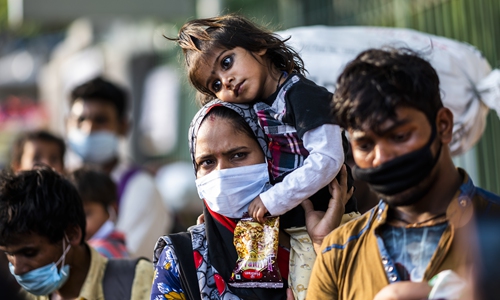India’s support of COVID-19 review doesn’t equal hostility toward China
By Liu Xiaoxue Source:Global Times Published: 2020/5/19 17:20:48

A migrant worker mother carries her daughter on her shoulder as she walks along a street during a nationwide lockdown imposed as a preventive measure against the spread of COVID-19 in New Delhi, India on Wednesday. Photo: AFP
Indeed, some Indian politicians and media outlets have recently joined the ridiculous blame game regarding the pandemic, but it's not difficult to see that what they want is attention, and they can't represent the Modi government. To date, the Indian government hasn't accused any country of being responsible for the outbreak.
Faced with the raging pandemic and the resulting economic blow, India's most pressing challenge is to contain the spread of the deadly virus and boost its economy. At this juncture, it's paramount for the South Asian nation to maintain friendly economic and trade relations with China.
The Modi government has extended its nationwide lockdown until May 31 while easing restrictions in certain sectors to boost economic activity. In addition, the government has also announced a package totaling $265 billion - 10 percent of its GDP - to help the economy get back on its feet sooner.
Against the backdrop of interrupted global supply chains and rising protectionism amid the pandemic, Indian Prime Minister Narendra Modi stressed the need for "a self-reliant India" in his latest economic package announcement. But that doesn't necessarily mean the nation will roll out more trade protection measures.
India needs international trade for its economic recovery, especially with China, which has brought the outbreak under firm control in the shortest time and is accelerating economic recovery.
India needs Chinese investments, particularly as it tries to rekindle an economy with an elevated fiscal deficit. India welcomes more foreign investment to inject energy into its economy, but it fears hostile corporate takeovers. To speed up economic recovery, India will definitely try to woo more Chinese companies to expand their production in India.
China hopes India can cherish its current economic ties and promote deeper cooperation. China will support India's return to negotiations on the Regional Comprehensive Economic Partnership (RCEP), Chinese Vice Minister of Commerce Wang Shouwen said at a press conference on Monday.
Chinese investment has created vast opportunities for India's "Make in India" campaign and the country's employment. China hopes India can provide a level playing field for Chinese companies, building an open and transparent business environment.
Chinese Ambassador to India Sun Weidong said in a recent interview that China and India should implement the agreements reached by the leaders of both countries, cooperate to promote trade and investment liberalization and facilitation, and work toward mutual benefit. That is the correct choice that best serves the common interests of the two countries.
Chinese border defense troops have reportedly bolstered border control measures and made necessary moves in response to India's recent, illegal construction of facilities on the border in the Galwan Valley region. But China and India will not engage in confrontation over the borders. As the largest and third-largest economies in Asia, the two countries have the wisdom to avoid conflict.
The 21st century is the century of Asia, and China and India have reached a consensus to cherish the current precious development opportunities.
The author is Liu Xiaoxue, an associate research fellow at the National Institute of International Strategy of the Chinese Academy of Social Sciences. bizopinion@globaltimes.com.cn
Posted in: EXPERT ASSESSMENT